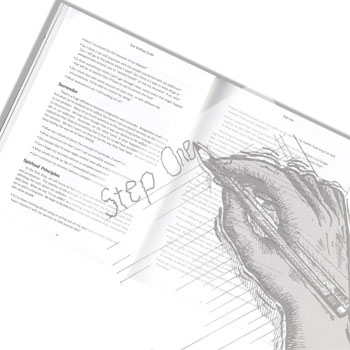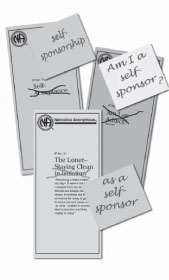 |
|
|
|
Feature What I value I used to dread the day when the past year’s income tax returns were due. Of course, when I was using, I assumed I was exempt from needing to pay taxes, so I rarely filed. I also figured that since the government seemed to have enough money of its own, I had license to get creative those few years I did happen to send in a tax return. In other words, I cheated. After I was clean a couple of years, I was blessed with a sponsor with whom I was able to get honest about my resentments against authority and the government. Although I admitted my negligence in not paying taxes, I thought I might get a pass from my sponsor when it came to making amends. I had all kinds of justifications and rationalizations: how paying my back taxes might harm my family or might lessen my ability to gain employment and benefit my community; or that the government had stolen land from people all around the world, so it wasn’t righteous enough to take my money. I was prepared to talk my way out of this obligation with all my remaining slickness, but my sponsor would have none of it, and simply told me to pay the taxes I owed. He assured me that I’d feel relieved once I had completed this and the other amends on my list. After several years of payment schedules and tight budgeting, I no longer owed anyone any money, including Uncle Sam. It’s hard to describe how right my sponsor was when he reassured me that these amends would allow me to feel freedom and relief. I don’t dread tax time anymore. Don’t get me wrong; I’m not overjoyed at turning over my cash. But I understand the obligation, and I’m willing to comply with the laws. In fact, I‘ve found that preparing my taxes has encouraged me to take an annual financial inventory. It’s been amazing to see just how much I spend on different items. In a sense, it’s a good way to see what I value. This is especially true when I look at my spending in areas beyond the necessities of housing, food, and utilities. I can tell you I’m not a big theater- or moviegoer, and I like to buy many more books than I read. This annual obligation has also helped me take a good look at what causes, charities, public service organizations, and relief efforts I support. The amount of money I donate has grown as my earning ability has increased. I suppose that makes sense, since everything we consume has increased in price over the years. When I got clean, a gallon of gas cost $1.25; a pack of cigarettes was $1.50; a loaf of bread cost 55 cents; and water was free since it came out of the faucet and went straight into a glass. Back then, I put $1.00 in the basket. Many things have changed since I got clean. Most of the things I consume have doubled or tripled in price. Now I am fortunate enough each year to be able to donate an amount almost as great as the dreaded back tax bill I owed when I first got clean. Yet, this year I realized I’m still putting $1.00 in the basket, and I haven’t established a system of regular, planned giving to the fellowship that saved my life.
So this year I’ve decided to do something about it, and here’s my plan:
I know I might not work this plan perfectly, but I’ve learned from so many of my friends in the fellowship that if I really commit to this, and have some continued encouragement, I’ll be successful and will find more of that freedom my original sponsor told me about. He’s dead now, but I’m sure he would be happy to know that I’m continuing to grow in my recovery. Surrender Surrender is my favorite spiritual principle. When I act on it, I usually realize that had I surrendered way back in the beginning of the situation, I would have saved myself a whole lot of suffering. One way of surrendering is to “turn it over” to my Higher Power. It’s amazing that when I ask, I get an answer—not always the one I want, but the one that works if I surrender to it. Seven years ago, when I started working the steps from the Step Working Guides with my sponsor, the answer to my prayers for guidance would usually be to surrender to the situation and write on whatever step I happened to be on at the time. Somehow that step—whichever one it was—would give me a perspective that I could understand and accept. One of these times, a conflict arose between myself and someone I love. I wrote endlessly on the step I was on at the time. I finally came to the conclusion that what I wanted was peaceful resolution so the knot in my stomach would go away. Finally, I surrendered to the situation. I couldn’t change the other person’s perceptions, so I surrendered trying to be “right.” I learned that I need to do things differently in this area with this person in the future. It’s more important to me to have serenity than to have that person acknowledge that I am right.
Parting sorrow My name is Shawn. I’m a recovering addict and a member of the Hole in the Wall Group at Oregon State Penitentiary. I started using at age five or six with my older brother and the drug dealer who lived in our camper in the backyard. From age eleven on, I was raised in boys’ homes and cages as addiction took its natural progression from my early using to the extremes. I can’t remember really having fun or enjoying being high. It was just an escape, a numbing of the reality that was my life—anything to change the feelings or shut them off, even for just a few miserable hours. But no matter how fast or far I ran, I couldn’t get away from me! No matter where I went, there I was. Today I’ve chosen to live my life clean, facing my problems and feelings head-on. What a relief that has turned out to be. I know God didn’t design me to be high and disengaged from life. No
matter where I went, Not too long ago, my best bro and I were selected to interview each other for a public radio project: a collection of oral histories that were recorded all over the United States, aired on the radio, and stored in the Library of Congress. My friend shared about his certainty that he would someday be released from this institution. Twenty-five days after our interview was played on the radio, my friend was found dead of an overdose on the floor of his cell. This guy was a loving husband and father with thirteen children and twelve grandchildren. He had a larger-than-life persona and knew how to be a friend. If anyone needed help, he was always there. He was a gentle giant of a man. He started showing up at meetings, but his attendance was sporadic. I thank God we had enough of a program to love him no matter what. He had a lot of anger, shame, and despair in him. Sometimes he would talk about it, but he could not—would not—work the steps. My friend died of our disease, and not a day goes by that I don’t miss him and feel the pain of this loss. My grief cuts deep. He has now found his freedom and peace. Every day, I remember that no matter what, we don’t have to end this way. Today, I know the scope and true meaning of powerlessness. Everything to gain I was convinced early in my life that no one truly cared for or loved me. I would go to whatever extremes necessary to gain any type of friendship. I found myself among those who used drugs. I wasn’t pressured to use by my new friends, but they seemed so happy, and I wanted what they had. As I used, I began losing family, friends, possessions, and self-respect. I was in the process of a divorce when I began another relationship, but I didn’t trust myself, so how could I trust anyone else? My finances were in ruin as well. I pawned everything I owned. I should have been the owner of the store because so much of what was in there was mine. I was always able to keep a job, but everything I earned went to drugs. I had the desire to stop using, but didn’t know how. I had relied on myself for too long. I developed into a controlling, self-centered, inconsiderate woman. I was killing myself. A moment of clarity sank in one day when five friends came to my apartment. One had fifty cents, another had a quarter, and amoung all of us, we had five dollars. Though we were all hungry, needless to say we didn’t purchase food, and the drugs we bought simply made the cravings worse. I realized my drug use was only a small symptom of my problem. I needed help. I knew I couldn’t do this anymore. I was desperate and needed to surrender my will for God’s will in my life. I went to the daycare to say good-bye to my children. I packed a few items, quit my job, and left my apartment with everything in it. When I went into rehab I had nothing to lose and everything to gain.
Self-sponsorship During my recovery, I’ve periodically lapsed into sponsoring myself. If I were the only addict who had ever done this, it would be humiliating, but not worthy of writing an article for The NA Way. However, it seems this resistance to allowing others to help us is common among addicts. So, if you answer “yes” to any of the following questions, then maybe you, too, have some experience with self-sponsorship:
Simply put, self-sponsorship is the resistance against seeking and accepting the love and experience of a sponsor. This can lead to delayed or inferior solutions to the problems we face, isolation from fellow addicts, and eventual relapse. Not all sponsors are perfect—but even with their imperfections, allowing a sponsor to help can significantly increase the likelihood that we’ll be able to stay clean and have more rapid relief when we do face troubles.
Despite my periodic lapses into self-sponsorship, all of the significant, positive, life-changing experiences in my recovery have occurred through working the steps with a sponsor. Give yourself a chance to let go of your mistrust, anger, resentment, fear, and loneliness and get a sponsor. As they told me when I got here: Try it for thirty days, and if it doesn’t work, we’ll refund your misery. “The Twelve Steps of Madness”
Adapted
from an article printed in Juntos, |
| Contact NA World Services |
|
Return to Home Page |


